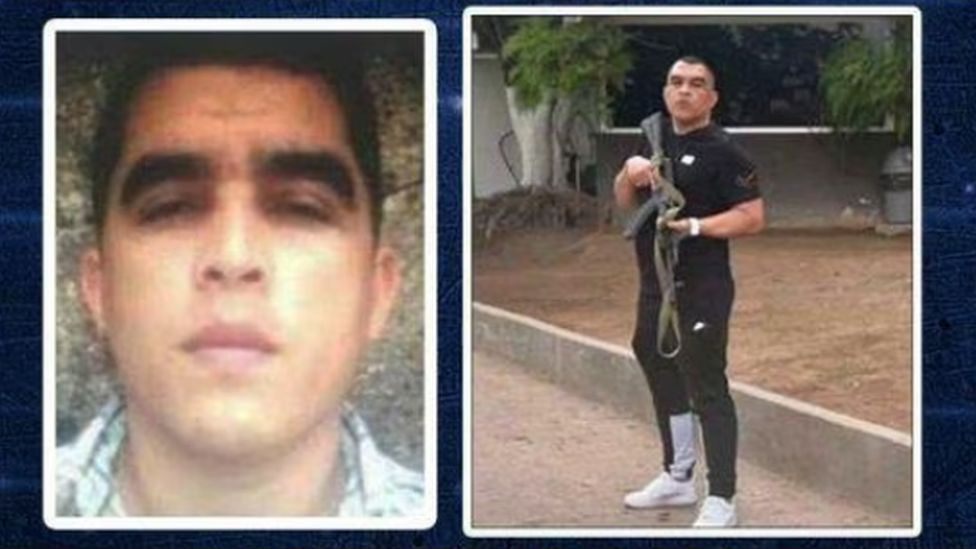ARTICLE AD BOX
 Image source, Venezuelan Interior Ministry
Image source, Venezuelan Interior Ministry
The Venezuelan authorities have issued a wanted poster for the fugitive
By Vanessa Buschschlüter
BBC News
Police across South America are searching for the leader of a Venezuelan gang who escaped from the luxurious prison which he controlled, shortly before it was raided.
When 11,000 soldiers and police entered the inmate-run Tocorón jail in Venezuela on Wednesday, Héctor Guerrero Flores was nowhere to be found.
The jail boasted a small zoo, a nightclub and a swimming pool.
The 39-year-old from Aragua state in Venezuela has been in and out of Tocorón prison for more than a decade.
In 2012, the leader of the Tren de Aragua transnational crime gang managed to escape from the jail by bribing the guards.
After his re-arrest in 2013, he was returned to the same prison, but it appears his power inside the jail - and over those tasked with guarding him - only grew.
Not only did he turn Tocorón into the nerve centre of the Tren de Aragua criminal enterprise, but under his rule, the jail was equipped with all the trappings of a luxury hotel.
Families of inmates moved into the compound. Inmates had access to a makeshift bank, a betting shop, a restaurant and a baseball diamond, while their children could marvel at flamingos and ostriches in the animal enclosure.
Guerrero Flores reportedly could come and go as he pleased. Venezuelan author Ronna Rísquez, who has written a book about the Tren de Aragua, recounts how police came across him once at a party on a yacht in 2016.
According to Rísquez, the convict calmly showed officers a safe conduct issued by Venezuela's prison service allowing him to travel freely through the country.
Humberto Prado, the director of the Venezuelan Prison Observatory NGO, told BBC Mundo that Guerrero Flores lived "like a king" inside the jail and probably returned to it because of the security it offered.
"He had an entire floor to himself, with all the luxuries... double beds, plasma screens, sound systems. He even had his own bodyguards and no one could enter the floor without his permission."
According to Mr Prado and others familiar with the conditions inside the prison, Guerrero Flores had no rivals inside the prison and could therefore rule safely over his ever-expanding criminal network.
The Tren de Aragua has under his leadership expanded into Colombia, Ecuador, Peru and Chile and diversified from extorting migrants into sex-trafficking, contract killing and kidnapping.
Image source, Peruvian Interior Ministry
Image caption,Peru is offering a reward for information leading to the capture of Héctor Guerrero Flores
The gang's reach is such that the Chilean President, Gabriel Boric, referred to it directly, saying that "we are going to hunt them down, jail them, and in cases where it is necessary, expel them".
Pressure from Latin American leaders is thought to have led to the massive security operation launched by the Venezuelan authorities last week at the Tocorón prison.
Officials said 11,000 soldiers and police were deployed to regain control of the jail from the inmates.
It was during the raid that the absence of Héctor Guerrero Flores was first noted, but Venezuelan officials did not make his escape public at the time.
It was not until Saturday, three days after the security operation, that Venezuela's interior ministry offered a reward for information leading to the capture of Guerrero Flores.
Despite the escape of its most powerful inmate, President Nicolás Maduro said the raid had been carried out "impeccably".
He did concede that "some inmates had escaped due to the corruption of officials, who had alerted the prisoners to the impending security operation".
The president said those responsible would be "severely punished".
Meanwhile, police in Colombia, Ecuador, Peru, Chile and Venezuela are searching for Héctor Guerrero Flores.

 1 year ago
55
1 year ago
55








 English (US)
English (US)